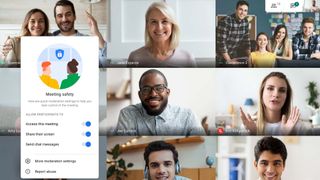Gmail and Google Meet get major security boost
New updates will help further protect remote workers and students online

Google has announced a number of new updates that provide even stronger security in Gmail, Meet and Chat in an effort to better help people working from home stay secure.
In order to keep Gmail's entire ecosystem secure, the search giant has announced the pilot of its new Brand Indicators for Message Identification (BIMI) standard.
The BIMI pilot will enable organizations, that authenticate their emails using DMARC, to validate ownership of their corporate logos and securely transmit them to Google. After these authenticated emails pass Google's anti-abuse checks, Gmail will begin displaying an organization's logo in the service's avatar slot so that users know these emails come directly from a company and not from someone impersonating them.
- We've put together a list of the best webcams on the market
- These are the best business laptops available now
- We've also highlighted the best online collaboration tools
Google will begin its BIMI pilot in the comping weeks with a limited number of senders. The Certification Authorities Entrust Datacard and DigiCert will also be working with the company to validate logo ownership. In order to prepare for BIMI's official launch in the coming months, Google recommends that organizations start adopting DMARC now if they haven't done so already.
Meet security controls
Google also announced that it will be rolling out new security controls for Google Meet in the coming weeks to help ensure that only intended participants can join video meetings. During the initial rollout, these new options will first be available for consumer and G Suite for Education accounts.
First off, Google is giving meeting hosts increased control over who is able to “knock” and join their meetings. Once an attendee is ejected from a meeting, they won't be able to attempt to join the same meeting again by knocking unless the are re-invited by the host. Additionally, if a knocking request from a user has been denied multiple times, the user will be automatically blocked from sending more requests to join the meeting.
Google is also giving Meet hosts advanced safety locks to allow them to better protect meetings with a few simple clicks. With these new safety locks, hosts can decide how a user can join a meeting and even require users to obtain explicit approval to join.
Are you a pro? Subscribe to our newsletter
Sign up to the TechRadar Pro newsletter to get all the top news, opinion, features and guidance your business needs to succeed!
By enabling safety locks, hosts will block all anonymous users that are not logged in with a Google account from attempting to join their meetings. There are also specific safety locks that enable the host to control how participants interact in a meeting. For instance, the chat lock and present lock will enable hosts to control which attendees can chat and present within the meeting.
The new features announced for Google Meet will certainly come in handy as schools and universities plan to reopen digitally in the fall.
- Also check out our complete list of the best antivirus software
After working with the TechRadar Pro team for the last several years, Anthony is now the security and networking editor at Tom’s Guide where he covers everything from data breaches and ransomware gangs to the best way to cover your whole home or business with Wi-Fi. When not writing, you can find him tinkering with PCs and game consoles, managing cables and upgrading his smart home.
Most Popular


